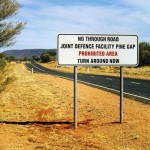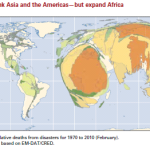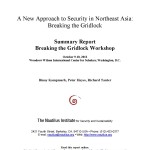- DETERRENCE: Characterizing the North Korean nuclear missile threat
- DPRK: Korea, China hold strategic dialogue
- ENERGY SECURITY: Time is running out: the Doha climate talks must put an end to excuses
- GOVERNANCE AND CIVIL SOCIETY: Rocket tit-for-tat in the Koreas?
- CLIMATE CHANGE ADAPTATION: Integrating climate resilience strategy into city planning in Semarang, Indonesia
- AUSTRAL PEACE AND SECURITY: US pivot bumps Asian economic reality
Archives
Political Rocketry

Political Rocketry
by Peter Hayes – Deterrence Contributor
North Korea’s rocketeers reportedly are busy bees at the Sohae launch site. Why now?…
Australia in the Pacific pivot: national interests and the expanding “joint facilities”

Richard Tanter notes grave concerns raised by former Australian prime ministers concerning strategic policy towards China, and potential differences between Australian and US interests. The annual Australia-United States ministerial coordinating meeting brought an unprecedented level of Australian support for American space military capacities and closer technical integration through an escalating number of “joint facilities”. Tanter concludes by noting that “without the capacity to recognize and act on national interests, a country with a parliamentary democracy operates under a severe democratic deficit. Without that capacity, democratic policy formation about defence becomes a contradiction in terms, and more to the point, a dangerous impossibility.”
Richard Tanter is an Associate at the Nautilus Institute, and professor in the School of Social and Political Studies at the University of Melbourne.
Email: rtanter@nautilus.org
Australia in the Pacific pivot: national interests and the expanding “joint facilities”

Richard Tanter of the Nautilus Institute notes grave concerns raised by former Australian prime ministers concerning strategic policy towards China, and potential differences between Australian and US interests. The annual Australia-United States ministerial coordinating meeting brought an unprecedented level of Australian support for American space military capacities and closer technical integration through an escalating number of “joint facilities”. Tanter concludes by noting that “without the capacity to recognize and act on national interests, a country with a parliamentary democracy operates under a severe democratic deficit. Without that capacity, democratic policy formation about defence becomes a contradiction in terms, and more to the point, a dangerous impossibility.”
Richard Tanter is Senior Research Associate at the Nautilus Institute, and professor in the School of Social and Political Studies at the University of Melbourne.
Email: rtanter@nautilus.org
Nautilus Peace and Security Weekly – 22 November 2012
- DETERRENCE: Preparing for the Helsinki conference on a Middle East Nuclear and WMD-free zone
- DPRK: N. Korea tried to ship weapons to Syria, diplomats say
- ENERGY SECURITY: Obama victory reopens door to emissions curbs and possible carbon tax
- GOVERNANCE AND CIVIL SOCIETY: Tokyo’s Ishihara joins Osaka mayor to fight election
- CLIMATE CHANGE ADAPTATION: Climate change and eHealth: a promising strategy for health sector mitigation and adaptation
- CLIMATE CHANGE AND SECURITY: Climate change and eHealth: a promising strategy for health sector mitigation and adaptation
Sins in the name of children

Sins in the name of children
by Nikhil Desai – Energy Security Contributor
Every climatic disaster is an opportunity to demonise fossil fuels and whip up guilt, anxiety, moral pretensions, and political…
Summary Report: A New Approach to Security in Northeast Asia – Breaking the Gridlock Workshop

This summary report is based on the New Approach to Security in Northeast Asia: Breaking the Gridlock workshop, which convened senior international experts in the field of security in Washington, D.C. on October 9th and 10th, 2012. The purpose of this meeting was to access Morton Halperin’s proposal that establishing a Northeast Asian Nuclear Weapons Free Zone (NEA-NWFZ) would strengthen peace and security in the region, reinforce the nuclear non-proliferation regime and facilitate nuclear disarmament on the Korean Peninsula. The workshop built upon the findings of the East Asia Nuclear Security Workshop in 2011 to further explore the proposal’s limits, weaknesses and possible means of implementation.
Binoy Kampmark is a Lecturer at the Royal Melbourne Institute of Technology. Peter Hayes is the Executive Director of the Nautilus Institute and Richard Tanter is an Associate of the Nautilus Institute.
Nautilus Peace and Security Weekly – 15 November 2012
- DETERRENCE: Joint Declaration on Mongolia’s Nuclear-Weapon-Free Status
- DPRK: North Korea conducts large rocket motor tests: construction at Sohae Launch Pad
- ENERGY SECURITY: Saudi America: The U.S. will be the world’s leading energy producer, if we allow it
- GOVERNANCE AND CIVIL SOCIETY: Professors unite against nuclear energy
- CLIMATE CHANGE ADAPTATION: Education sector responses to climate change: background paper with international examples
- AUSTRAL PEACE AND SECURITY: Coalition leaders float nuclear navy
Another hinge for the Pacific Pivot: Australia’s nuclear navy?

Another hinge for the Pacific Pivot: Australia’s nuclear navy?
by Richard Tanter – Austral Peace and Security Contributor
One of the hinges in the Pacific pivot is closer alignment of the US and its longterm allies, especially Japan, Korea and…
Key Elements of Northeast Asia Nuclear-Weapons Free Zone (NEA-NWFZ)

Hayes and Tanter offer a brief overiew of the benefits of establishing a Nuclear Weapons Free Zone in Northeast Asia. They then evaluate critical elements and issues associated with establishing such a zone, including monitoring and verification, membership, obligations, enforcement and the legal and political issues surrounding both North Korea and Taiwan.
Peter Hayes is the Executive Director of the Nautilus Institute and Richard Tanter is an Associate of the Nautilus Institute.
This report was originally presented at the New Approach to Security in Northeast Asia: Breaking the Gridlock workshop held on October 9th and 10th, 2012 in Washington, DC.

